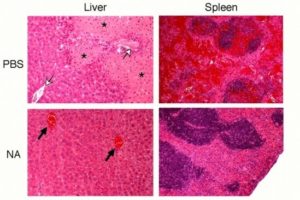molecular biology
Plant scientists move closer to making any crop drought-tolerant
RIVERSIDE, Calif. — Drought-tolerant crops have moved closer to becoming reality.
A collaborative team of scientists has made a significant advance on the discovery last year by the University of California, Riverside’s Sean Cutler of pyrabactin…
Growing drought-tolerant crops inching forward
A collaborative team of scientists led by researchers at The Medical College of Wisconsin, in Milwaukee, has used the tools of structural biology to understand how a synthetic chemical mimics abscisic acid (ABA), a key stress hormone that helps plan…
Researchers discover gene that contributes to sense of balance
Researchers have discovered a gene that appears to be critical for maintaining a healthy sense of balance in mice. The study, led by a team at Washington University School of Medicine in St. Louis, appears in the April 1 issue of the journal Human Molecular Genetics and online March 24. “Loss of balance is a significant problem in the elderly because it can lead to dangerous falls and injuries,” says one of the study’s principal investigators, David M. Ornitz, M.D., Ph.D., professor of molecular biology and pharmacology at the School of Medicine. “Loss of balance also is a problem for astronauts following exposure to zero gravity. Now that we’ve discovered this new gene, we can begin to understand the mechanisms that allow the body to sense gravity and maintain balance.”
Search and Destroy: Newly Identified Gut Protein Kills Bacteria
Researchers have discovered a new antibiotic protein that appears to kill certain types of bacteria in the intestine. Their results are published Jan. 27 in the online version of the journal Nature Immunology and are slated for print publication in March. “These findings were completely unexpected,” said the study’s lead scientist. “We initially thought that this protein might be involved in blood vessel formation. What we discovered, though, is that it’s a potent killer of bacteria.”
Caught sleeping: Study captures virus dormant in human cells
Scientists have taken an important step toward understanding a virus that infects and lies dormant in most people, but emerges as a serious illness in transplant patients, some newborns and other people with weakened immune systems. The virus, called human cytomegalovirus, enters the bone marrow and can hide there for a lifetime. Until now, however, scientists had not been able to study the virus in its latent stage because it infects only humans and does not readily infect or become dormant in laboratory strains of bone marrow cells. In a new study researchers demonstrated a laboratory system for studying the virus in its latent stage and discovered a set of genes that may give the virus its great capacity for stealth.
Mighty Mice Are Less Susceptible To Muscular Dystrophy Gene’s Effects
The scientists who first discovered that knocking out a particular muscle gene results in “mighty mice” now report that it also softens the effects of a genetic mutation that causes muscular dystrophy. The findings build support for the idea that blocking the activity of that gene, known as myostatin, may one day help treat humans with degenerative muscle diseases.



